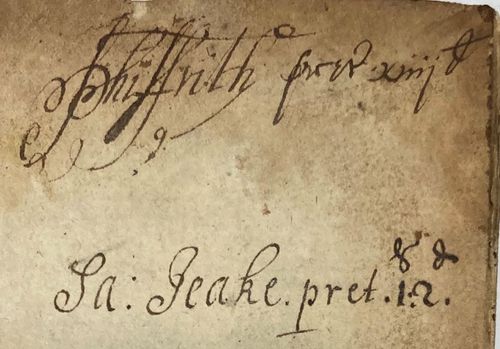Difference between revisions of "Samuel Jeake 1623-1690"
(→Books) |
|||
| Line 7: | Line 7: | ||
====Books==== | ====Books==== | ||
Jeake was an active book buyer throughout his life, and the contents of his library of ca.2100 volumes are known from his [[format::manuscript]] catalogue, now in the Jeake manuscripts at [[organisations::Rye Castle Museum]]. This has been edited and analysed in detail by Michael Hunter and others (see below). Letter books and other manuscripts (now in the East Sussex Record Office) detail Jeake's dealings with London booksellers, from whom many of the books were purchased, both new and secondhand. There is also evidence of a more informal local market in books in [[location::Rye]]. The contents are wide-ranging in subject, but are noteworthy for the proportion of radical [[subject::theology|theological]] and [[subject::politics|political]] books of the mid-17th century. A quantity of [[subject::science|scientific]] and [[subject::medicine|medical]] material, and a collection of [[format::almanacs]] was added in 1670 through the bequest of [[crossreference::Philip Frith d.1670|Philip Frith]]'s books to Jeake's son (also Samuel, 1652-99). The library remained with the family for some generations but began to be dispersed during the 18th century, and only a small proportion of Jeake's books can be traced today, in libraries across the world. | Jeake was an active book buyer throughout his life, and the contents of his library of ca.2100 volumes are known from his [[format::manuscript]] catalogue, now in the Jeake manuscripts at [[organisations::Rye Castle Museum]]. This has been edited and analysed in detail by Michael Hunter and others (see below). Letter books and other manuscripts (now in the East Sussex Record Office) detail Jeake's dealings with London booksellers, from whom many of the books were purchased, both new and secondhand. There is also evidence of a more informal local market in books in [[location::Rye]]. The contents are wide-ranging in subject, but are noteworthy for the proportion of radical [[subject::theology|theological]] and [[subject::politics|political]] books of the mid-17th century. A quantity of [[subject::science|scientific]] and [[subject::medicine|medical]] material, and a collection of [[format::almanacs]] was added in 1670 through the bequest of [[crossreference::Philip Frith d.1670|Philip Frith]]'s books to Jeake's son (also Samuel, 1652-99). The library remained with the family for some generations but began to be dispersed during the 18th century, and only a small proportion of Jeake's books can be traced today, in libraries across the world. | ||
| − | + | [[file:JeakeFrith.jpeg|thumb|500px|The inscriptions of Philip Frith, and of Samuel Jeake the younger, from a copy of T. White, ''Peripateticall institutions'', 1656, Princeton University Library B1299.W454 I5713s]] | |
====Characteristic Markings==== | ====Characteristic Markings==== | ||
| − | + | Both Jeakes, father and son, typically inscribed their books with their name, and the price paid. Many surviving examples are very simply bound in wrappers from discarded legal documents. | |
====Sources==== | ====Sources==== | ||
Revision as of 06:37, 28 August 2023
Samuel JEAKE 1623-1690
Biographical Note
Born at Rye, son of Henry Jeake, baker. His education is not recorded but he became a leading figure in Rye in the 1640s as a supporter of the parliamentary cause in the Civil War. He became town clerk of Rye in 1651, was registrar there later in the 1650s, and sometimes preached. After the Restoration he led the town's nonconformist congregation, while also working as a lawyer there; during the 1680s, he spent some years in London.
Books
Jeake was an active book buyer throughout his life, and the contents of his library of ca.2100 volumes are known from his manuscript catalogue, now in the Jeake manuscripts at Rye Castle Museum. This has been edited and analysed in detail by Michael Hunter and others (see below). Letter books and other manuscripts (now in the East Sussex Record Office) detail Jeake's dealings with London booksellers, from whom many of the books were purchased, both new and secondhand. There is also evidence of a more informal local market in books in Rye. The contents are wide-ranging in subject, but are noteworthy for the proportion of radical theological and political books of the mid-17th century. A quantity of scientific and medical material, and a collection of almanacs was added in 1670 through the bequest of Philip Frith's books to Jeake's son (also Samuel, 1652-99). The library remained with the family for some generations but began to be dispersed during the 18th century, and only a small proportion of Jeake's books can be traced today, in libraries across the world.
Characteristic Markings
Both Jeakes, father and son, typically inscribed their books with their name, and the price paid. Many surviving examples are very simply bound in wrappers from discarded legal documents.
Sources
- Cambers, A. Godly reading, 2011, 127.
- Hoare, P. (gen.ed.), The Cambridge history of libraries in Britain and Ireland. 3 vols. Cambridge, 2006, II 182-4.
- Hunter, Michael. "Jeake, Samuel (1623–1690), lawyer and nonconformist preacher." Oxford Dictionary of National Biography.
- Hunter, M. et al, A radical’s books: the library catalogue of Samuel Jeake (1999).
- Murphy, A., The worlds of the Jeake family of Rye, 1640-1736, Oxford, 2018.
